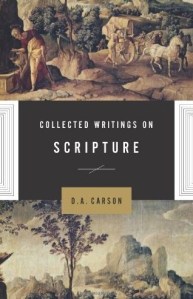Book Review: Collected Writings on Scripture


Collected Writings on Scripture, D. A. Carson, Wheaton: Crossway, 2010. Hardcover, 335 pages, $30.99.
Let me say right away that this book is not written for a broad audience. The readers who will most benefit will be biblical scholars/professors, pastors, seminary students, and perhaps others who have at least an undergraduate university education. This is a collection of mostly technical or more academic essays on the Bible. While Don Carson is able to write at a more popular level, these essays find him addressing complex issues that require more advanced responses. If terms like epistemology, redaction criticism and perspicuity don’t need explanation, then you should find this book accessible.
Carson is research professor of New Testament at Trinity Evangelical Divinity School in Wheaton, Illinois. He is the author of many books and articles and a popular speaker on the Christian conference circuit. While ecclesiastically a Baptist, he does hold Calvinistic convictions when it comes to the doctrine of salvation. Most importantly, he believes in a high view of Scripture – and that’s clear in this volume. When it comes to bibliology (the doctrine of Scripture), Reformed Christians have an ally in Carson.
Collected Writings consists of two parts. Part 1 contains five lengthy essays. The first, “Approaching the Bible,” is the most accessible and gives a basic introduction to biblical hermeneutics. “Recent Developments in the Doctrine of Scripture” is an older essay that surveys various challenges faced by a high view of Scripture’s inspiration, infallibility and inerrancy. “Unity and Diversity in the New Testament: The Possibility of Systematic Theology” takes on the often-discussed relationship between systematic theology, exegesis, and biblical theology. “Redaction Criticism: On the Legitimacy and Illegitimacy of a Literary Tool” – the title speaks for itself. Finally, the last essay answers the question “Is the Doctrine of Claritas Scripturae Still Relevant Today?” Part 2 features reviews of several books dealing with the authority, character, and interpretation of the Bible. It should be readily apparent that all of these essays and reviews consist of previously published material.
The church always faces challenges with regards to the doctrine of Scripture and so a book like this is always relevant, even when it features essays written in the early 1980s. I appreciate Carson’s lively defense of biblical inerrancy – a doctrine that needs to be freshly appropriated and guarded in our generation. Today there are also efforts underway to discount the contributions of systematic theology in favour of biblical theology – Carson brings a valuable perspective to this important debate. With the book reviews in part 2, two of them are particularly worth noting: Peter Enns’ Inspiration and Incarnation: Evangelicals and the Problem of the Old Testament; N. T. Wright, The Last Word: Beyond the Bible Wars to a New Understanding of the Authority of Scripture. The Enns book is important because it resulted in his departure from Westminster Theological Seminary in 2008. N. T. Wright is a popular figure associated with the false teaching known as the New Perspective on Paul. Both works require a fair and critical analysis and Carson provides it. In the end he makes it clear that men like Enns and Wright do not hold to the highest view of Scripture – to a thoroughly biblical view of the Bible.
I don’t have any serious problems with this volume. The only points that I might raise are incidental to its purpose and program. For instance, there’s footnote 35 on page 66 which regurgitates the old “Warfield was an evolutionist” line. More recent research by Fred Zaspel dispels that myth. As another example, on page 178 Carson states that Cornelius Van Til is right in his development of a biblical theory of knowledge (epistemology), “but then wrongly demands a presuppositionalist apologetic.” Unfortunately, this statement comes right at the end of an essay and is prefaced by the disclaimer that Carson cannot here defend his view. I’d like to hear more on that, because I’m not convinced. Could we not have had at least a footnote to some further discussion on that point somewhere else?
Don Carson is one of the most important theologians of our day. What makes him worth listening to is the fact that he humbly listens to our Father. I think these words sum it up: “…the aim of thoughtful Christians, after all, is not so much to become masters of Scripture, but to be mastered by it, both for God’s glory and his people’s good” (40).


